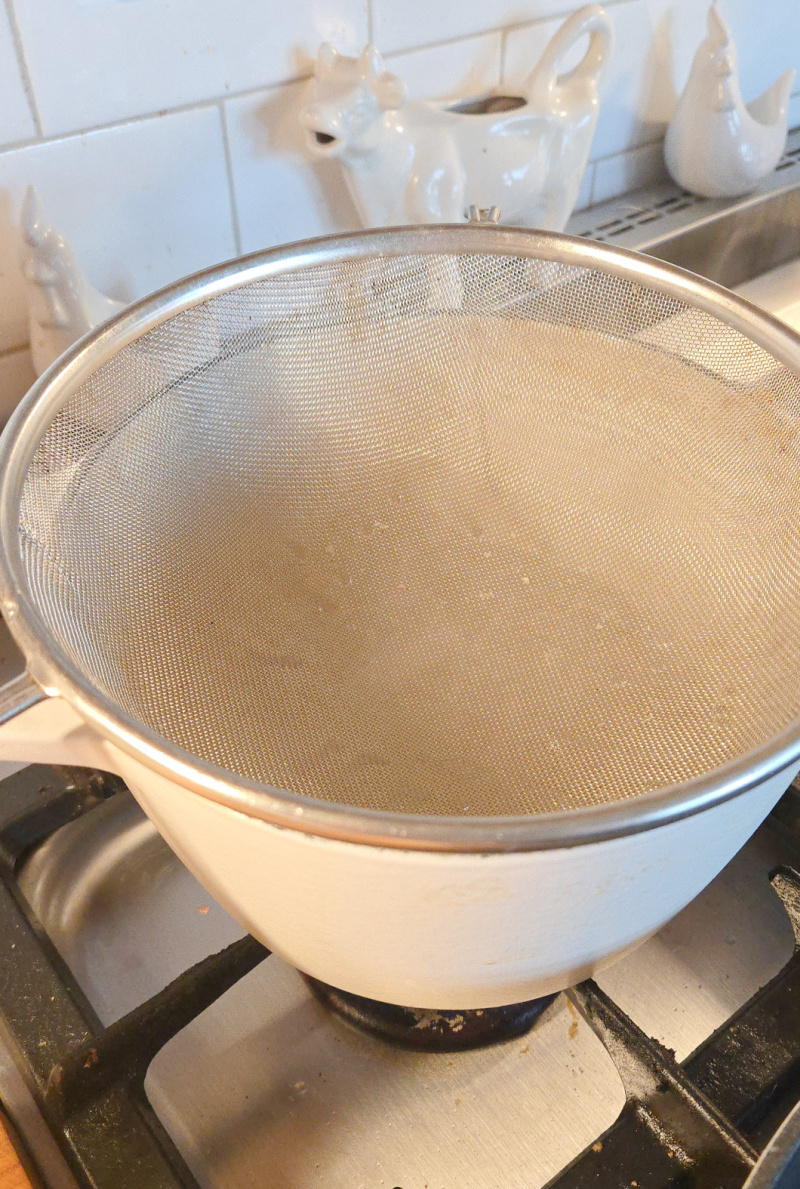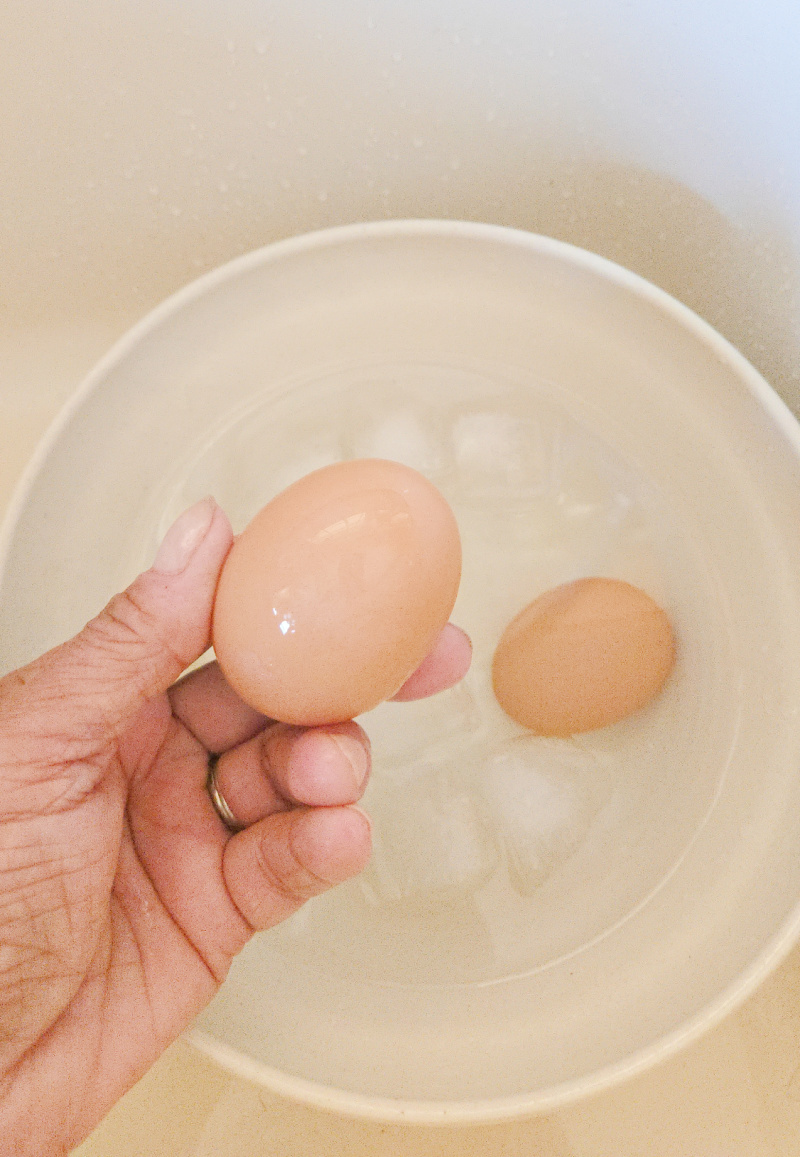I love hard-boiled eggs. I like to keep a container of them in the fridge to grab throughout the day when I get hungry for a quick, nutritious - and delicious - snack or to make up a batch of deviled eggs.
The one downside to farm fresh eggs is how hard they are to peel.
One Caveat: Don't Just Use "Old Eggs"
It makes me crazy when someone asks the question on social media about how to get eggs to peel and someone replies, "just put some aside for a few weeks, let them get old, then hard boil them and they'll peel fine".
Well, to me, that defeats the purpose of raising chickens for the fresh eggs if you're just going to let them sit around and get old.
In addition to just not tasting as fresh, an old egg won't be the perfect oval shape, since air seeps in through the shell as the egg ages. So an older egg will have that indentation or dip at one end when you hard boil it.
You really want a perfect egg-shape when you're making either hard boiled or deviled eggs.
So I was determined to figure out how to get easy-to-peel farm fresh eggs.
Various Methods for Cooking Hard Boiled Eggs
I'm pretty sure I tried every method out there - with mixed results.
I tried adding salt to the water, I tried adding vinegar to the water. I tried adding baking soda to the water. Nothing seemed to make much of a difference.
I tried poking a tiny hole in the eggshell with a pin. That was kind of a pain in the neck and again, didn't seem to help.
I tried using eggs straight from the fridge, I tried using room temperature eggs. I tried adding the eggs to cold water, and waiting until the water was boiling. And still, my fresh eggs wouldn't peel right.
My Secret For Peeling Fresh Eggs
Then several years ago, a friend told me a great tip for hard-boiled eggs. She said she learned it from her grandmother (don't grandmothers always have the best advice!) She told me to STEAM them instead.
- No more boiling.
- No more hard-to-peel eggs.
- No more waiting until your fresh eggs are old.
- No more salting the water or adding vinegar or baking soda.
- No more cracked eggs if they knock against each other or against the side of the pot in boiling water.
- More earth-friendly: you use WAY less water!
- And lastly, no more green/gray ring around the yolk
This method of cooking eggs is easy, quick and foolproof.
How to Steam Farm Fresh Eggs for Easy Peeling
What you Need
Steamer basket, bamboo steamer, colander, fine mesh strainer, etc.
Pot of water
Pot cover
Tongs
Bowl
Ice cubes
What you Do
Heat several inches of water to a gentle boil in a large pot. Set a colander, double boiler, vegetable steamer or bamboo steamer on top of the pot. Use whatever you've got. Doesn't matter. As long as the steam will get through.
(I don't have an Instant Pot, but I'm told by lots of you that you can make hard-boiled eggs right in your Instant Pot and they'll peel well for you. I can't personally vouch for this, but if you have an Instant Pot, it's worth a try!)
Rinse your eggs in warm water (you can use eggs you just collected that morning, if you want, trust me!) and place them in a single layer in the top of the steamer. Place a cover over the pot.
Then cook your eggs. How long will depend on how runny you like your yolks.
- Set your timer for 6 minutes for runny, jammy eggs.
- Set your timer for 8 1/2 to 10 minutes for soft set eggs.
- Set your timer for 12 to 14 minutes for hard cooked eggs.
- Extra large or duck eggs, steam for 20 minutes.
Then using the tongs, gently set the eggs into a bowl of ice water until they are cool enough to peel.
How to Peel Hard-Boiled Fresh Eggs
Roll each egg on the counter to break the shell and then crack the blunt end of the egg and start to peel the egg at that end.
If there is any air sac inside the egg, that's where it will be, so it will make it easiest to start peeling there. Carefully remove the shell from each egg.
Perfectly peeled eggs - every time. The shells will practically fall off!
So dust off that bamboo steamer, or veggie steamer basket. Or just use a colander if that's all you have.
And scroll down for my favorite egg salad and deviled egg recipes!
My Favorite Deviled Eggs
To make deviled eggs (I have a basic recipe I use and then add random stuff depending on what I have on hand!), I carefully scoop out the yolks and mash the yolks with mayonnaise, apple cider vinegar, a bit of sugar, and then add a bit of fresh dill, salt and pepper - and scoop the mixture into the halved whites with a small ice cream scoop then arrange them on a pretty deviled egg plate
My Favorite Egg Salad
If you want to make egg salad, just peel the eggs, then mash them in a bowl with a pastry cutter or fork and add some chopped onion, chives, fresh chopped herbs (I love dill or tarragon), mayonnaise (homemade if possible!), salt and pepper to taste.
And try steaming your eggs. I promise you once you try it, you will never boil eggs again.


















